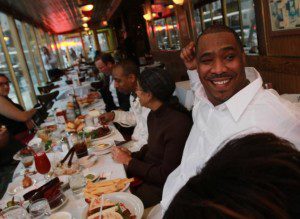Taste of freedom for man at last as his triple murder conviction is vacated after 22 years
By Denis Hamill NEW YORK DAILY NEWS

Anthony Yarbough Picture by Jesse Ward NEW YORK DAILY NEWS
Anthony Yarbough walked the Brooklyn streets as a free man after a judged tossed the verdict in the 1992 triple murder of Yarbough’s mother, step-sister and her friend.
The judge vacated his triple-murder conviction, the guards unlocked his hand and foot shackles, the courtroom broke into tears and applause. And for the first time in nearly 22 years Tony Yarbough was a free man.
One week before his 40th birthday, he hugged his aunt Sandra Vivas and cousin Sylvia Vivas and walked with stunted steps like he was still shackled out into the hallway of the 19th-floor Kings County Supreme Court building. He staggered into a storm of cameras and turned into a lawyer-client conference room with Phil Smallman and Zach Margulis-Ohuma, who worked four tenacious years to spring him.
He plopped in a chair in an crazy daze of freedom. I asked him what he missed most.
“My mom and my little sister,” he said on Thursday. “I did 22 years for killing them and my little niece, which I never did. And now that I’m free, I still miss them. I always, always will. I don’t even know where they’re buried.”
He dropped his head in his arms and sobbed softly and then excused himself as he knelt and rested his head in his hands on his chair and said a prayer as his big body rattled with the electrified emotions of liberty and exoneration.
“Forgive me,” he said. “I said a prayer to my mom. Asked her to watch over me as I try to make the best of the rest of my life. My mother was a lady with problems like we all have. But she had a wonderful heart.”
On the morning of June 18, 1992, Yarbough came home from a night of partying in Manhattan with his friend Sharrif Wilson to find the bodies of his mother, Annie Yarbough, 40, her daughter, Chavonn Barnes, and Latasha Knox, both 12, stabbed and strangled with electrical wires.
He was arrested for those crimes although there were no witnesses, physical evidence or real motive connecting him to the crimes. Wilson, a scared boy of 15, would eventually confess to committing the murders with Yarbough. But in 1999, while both were still in prison, another woman was murdered in Brooklyn in similar fashion.
Last year, the medical examiner’s office discovered that the DNA found in the woman murdered in 1999 matched the DNA found under Yarbough’s mother’s fingernails in 1992.
The two lawyers who had been working on the case for four years appealed to the court and the Brooklyn district attorney’s office to free both men. Wilson recanted his false confession before the DNA match and passed a polygraph requested by the Brooklyn DA.
On Thursday — 7,903 days after Tony Yarbough was incarcerated — Justice Raymond Guzman vacated the conviction with the blessing of the new Brooklyn DA, Kenneth Thompson.
“I cannot thank my two lawyers enough,” Yarbough said. “They believed in me, stuck by me, fought for me.”
He took a deep breath and said, “If there had been a death penalty in New York I would be dead by now. But instead I have lived long enough to get my freedom and be exonerated.”
He walked from the room and spoke to the press and rode the elevator down stairs and stepped out onto frigid Jay St. where he gulped the free winter air of Brooklyn. “I want the person who did this to my family to be caught and have to live through the hell I went through for 22 years,” he said. “I want to start my life with a clean slate.”
Yarbough will reside in a Fortune Society residence until he can find employment. The group helps former inmates adjust to life on the outside.
Someone dialed a cell phone, something he’d never used, and he spoke to his grandmother who still lives in the Coney Island Houses where the murders occurred.
“Grandma, it’s Tony,” he said. “I’m out. I’m free. I love you. And I will be seeing you soon.”
Then Tony Yarbough walked through the streets of downtown Brooklyn to Junior’s on Flatbush Ave. to eat his first meal as a free man.
“God is good,” he said. “It just feels so weird walking on the streets of Brooklyn again as a free man.”
Welcome home.
